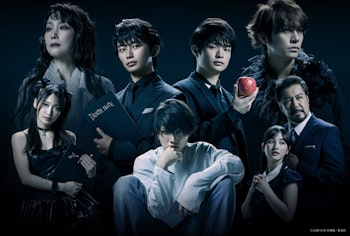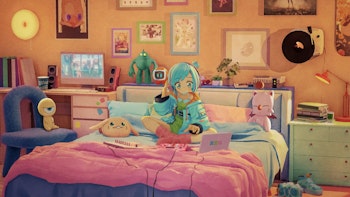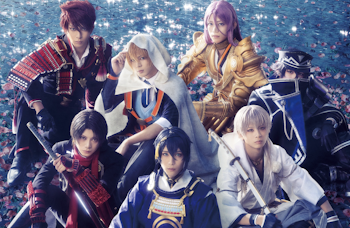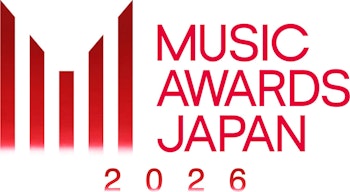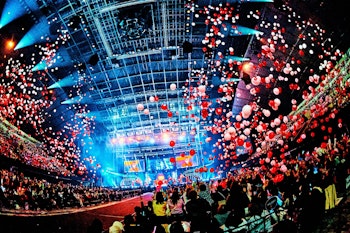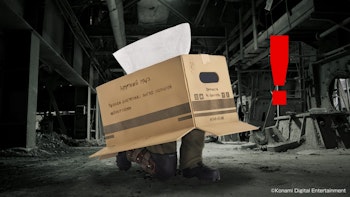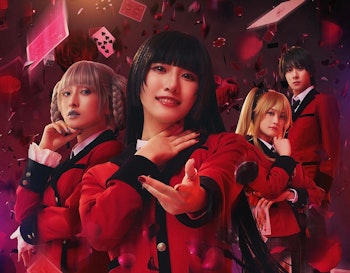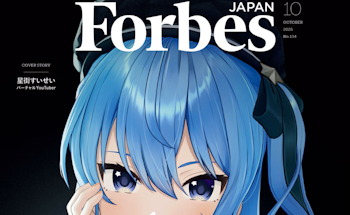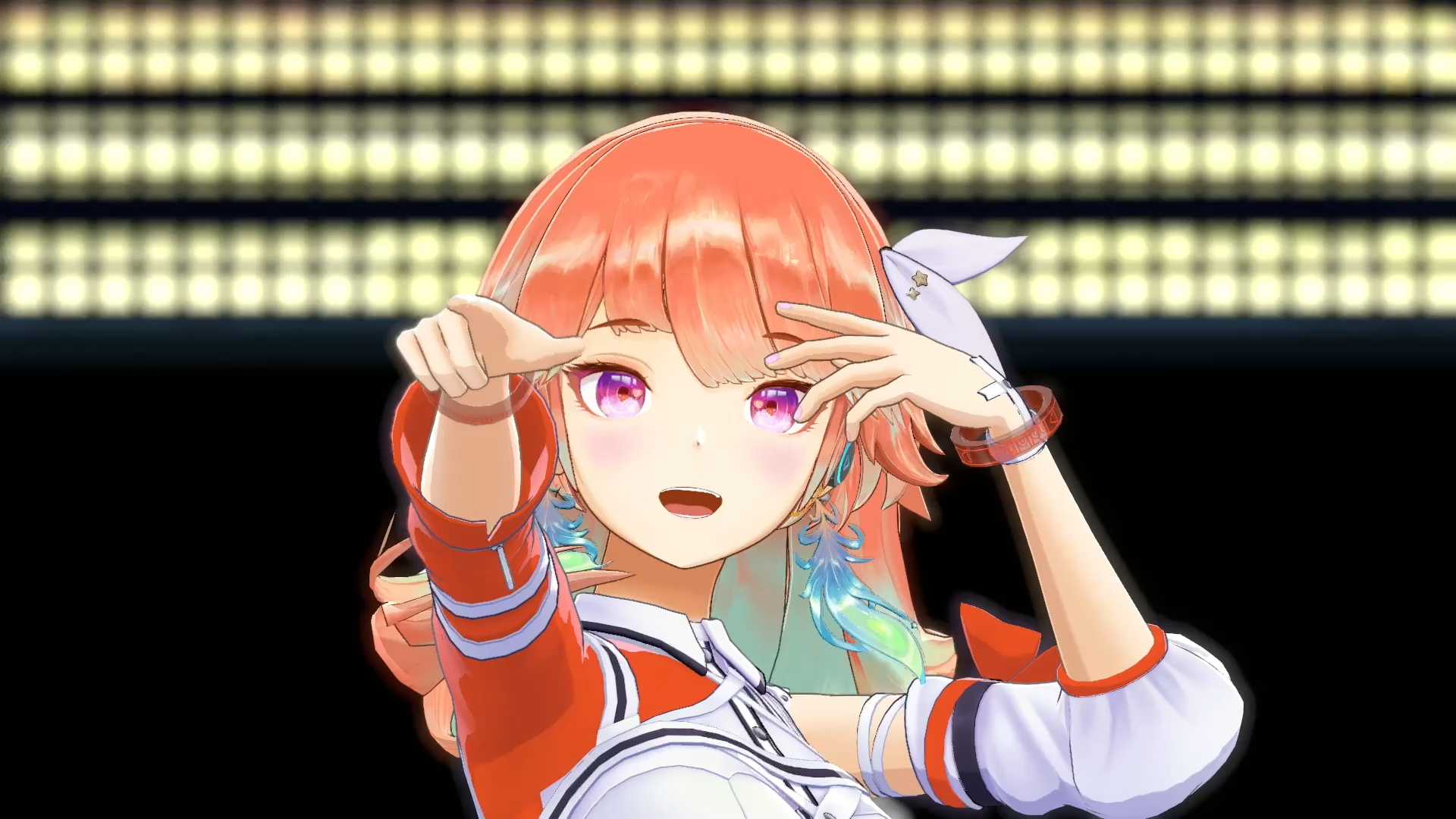
Kiara Takanashi’s latest song “Perfume” served as a chance for the Virtual YouTuber to flex her confidence. While she tells scrmbl that she’s always had input in the way her songs and music videos come together, the Austrian-born creator was able to take control for her latest, an uptempo cut taking cues from the sound of modern K-pop.
“I took much more creative direction. I almost directed every scene of the video,” she says over Zoom from her home, occasionally interrupted by her two cats. “‘Perfume’ is about feeling good in your skin and good with yourself.”
It’s a feeling Takanashi is highlighting more in her VTubing work. The character celebrates its fifth anniversary with virtual artist agency hololive later this year, while on July 6 she will hold a 3-D concert celebrating her own birthday. She’s one of the first major English-speaking creators in the space to gain global attention, debuting with hololive’s Myth stable and becoming something of a veteran for an industry anticipated to continue growing in the years ahead.
Yet she’s also been one of VTubing’s great ambassadors between Japan and the world. A longtime fan of J-pop idol music and video games, Takanashi is fluent in the language and uses her linguistic abilities to share insights into the country often overlooked. This can be via biggie-sized concerts celebrating the catalog of pioneering idol ecosystem Hello! Project or, within hololive, hosting “Holotalk,” a recurring series offering more depth to the performers at the agency, especially Japanese ones who might not get the chance to be fully appreciated.
“Since [viewers] don’t speak it fluently, they’ll just rely on clips that are translated. And I always feel like that’s just scratching the surface. It would be much nicer to get across the deeper details and personality tics of the Japanese talent that aren’t captured in those little two to three minute clips,” she says.
The world of virtual YouTubing is changing, both in how it develops but also in how it changes. In the months before our chat, two of Takanashi’s fellow Myth members — Amelia Watson and Gawr Gura — left hololive, reminding of the transience of this industry. Yet she remains upbeat about her role.
“For now, we will continue to work hard at bringing VTuber culture out there into the world.”
Ahead of her birthday show and fifth anniversary, scrmbl talked with Takanashi about “Perfume,” the impact of Hello! Project on her life and the challenges of VTubing. It has been edited for length and clarity.
scrmbl: Your latest single “Perfume” has a heavy K-pop influence, so I wanted to start from the beginning…how did you get into K-pop?
TAKANASHI: That would be like a million years ago [laughs]. Originally I was more into J-pop and especially Japanese idol groups, which were quite different. If you know you know. J-pop idols are more on the cutesy side. When I was more into that world, I did notice some K-pop going into my algorithm here and there. I think it was TWICE showing up that really showed me I liked it. While I was getting more into the sounds of K-pop, though, the music direction I wanted to go into for the longest time was still closer to the sound of J-pop idols.
I’ve experimented with that over my career, and in the early years with hololive, I realized that the audience was hoping for more English-language music. Not necessarily changing the genre, but they wanted more music from us in English. I didn’t actually feel comfortable singing in English at the time, because I was so used to singing in Japanese. But after releasing two songs in Japanese, I found a Vocaloid producer named KIRA, and he produced songs that had a slight hint of K-pop depending on the song. I thought, maybe with his help, I could make English-language songs, and I could dip into genres that, up until that point, I wasn’t too comfortable releasing myself. That’s where “Sparks” came from. “Sparks” was the beginning for me to change my whole trajectory.
It’s interesting, usually when I talk to non-Japanese artists it’s the opposite issue…they feel comfortable in their native language or English, and singing in Japanese terrifies them. What were the biggest challenges going from Japanese to English musically?
English isn’t my mother tongue, but I do think I am pretty fluent. So there’s never any real concern about speaking or singing in English. Over the years though, it has mostly been me listening to and singing Japanese music. It just felt like this is my world, and it’s what suited me best, because I didn’t have much confidence in my singing skills. I felt more comfortable in the whole idol world…with Japanese idol music, there’s great singers of course, but the overall focus is on the performance. You might have some idols who don’t sing too well.
That doesn’t mean that singing in Japanese solves all of these problems for me, but somehow the combination of singing J-pop songs in Japanese just lets me feel at ease. That was why there was kind of a hurdle mentally and emotionally for me to get over to singing in English. But now I’ve gotten used to it. Everything is fine!
You’ve cleared that hurdle, and you’ve leaned further into this K-pop-adjacent sound. That brings us to your latest song “Perfume.” When did that start taking shape?
I think it started taking shape way earlier than it needed to [laughs]. It was planned to be released in December originally, but came out around Easter time because I had my 3-D live around then. I always try to combine these lives with the release of new songs for promotions sake, and there were some delays. Normally, when I work on a song it takes three months. But this time we had more like six or seven. We really perfected the sound, and created the overall concept, and worked on the outfit design. It had a lot more time in the oven.
Let’s talk lyrics next, how did those take shape?
I don’t write the lyrics. Unfortunately I don’t think I’m talented enough to do that, but my lyric writer, monii, she’s really talented. She likes to add some spice to most of my lyrics, even when I wouldn’t do so myself [laughs] but she gives me somewhat of a push. I like that, it shows a different side of me. For “Perfume,” it’s all about — we’re going to talk metaphorically — finding the right scent for myself and putting one on that makes you feel good, makes you feel confident.
I think this song did make me feel more confident overall. I actually was able to take more control than usual in this song, especially in the music video. I took much more creative direction. I almost directed every scene of the video. “Perfume” is about feeling good in your skin and good with yourself.
I’d love to hear more about you taking control of the music video.
I’ve given rough directions for my other music videos, but for this one, the moment I heard the demo, I was actually sitting in an airport, waiting for my connection [laughs]. And I had nothing else to do. So I kept looping it over and over. And I kept doing that on the flight, staring out the window. Thanks to that, I developed this intricate view of what the video should look like.
When it became time to start working on the video, I conveyed all these thoughts. I wanted it to be in this European-looking old town, in a square, dancing around. I wanted a pool, an indoor pool. I wanted the lighting to be this sort of mid-day lighting, coming through big windows. It was the first time I had an exact vision, and I was very particular about how it would be executed.
Were there any challenges you had to overcome?
I think the only challenge really comes from someone I work with. He’s just one person but he does like the workload of 30 people. His name is Kanauru, he makes my 3-D videos. [laughs] The only challenge was that he likes to portray me in a more…spicy way. He opts for spicy angles. Even when I try to hold it back a bit. So sometimes I need to tell him that I find something a bit too spicy, and to cut it out.
That’s really interesting. For you personally, what’s kind of the “spicy” border? Like, when does something for you go a little too far?
[laughs] That is…that is something I’m also trying to find that answer recently. I feel over the past couple of years, things have changed a bit. I feel I’ve matured a lot, and the direction of my music has also matured a lot. Generally I think the outfits I have designed are maturing too. Which I think is not a bad thing. It’s an interesting change, not keeping everything the same all the time.
But yeah…I would like to keep the spiciness at like a hint-of level. People always see me as…they joke about me being very, um, horny or whatever [laughs]. But I’m just a little bird, a little innocent phoenix. I just really like the aesthetics of beautiful people and beautiful scenery. When it gets too spicy, I say “hold up.” I just want the aesthetics of of this to be pleasing to the eye, and not make my whole audience press “repeat” on a scene frantically because they can’t get enough of it. There’s this whole meme called “press 4” that we’ve created on my songs. Maybe you’ve noticed it?
I most certainly have seen that in the comments.
Yeah [laughs]. It has been going on since my song “Chimera” or wait, actually since “Mirage.” I don’t know if Kanauru did it on purpose when making the music video, but when you press a number on your keyboard while watching a YouTube video it goes to that percentage (writer’s note: As in, if you press “4” you will go the point in the video where 40 percent of it has played). In “Mirage” if you pressed “4” it went to a scene where I was crouching at a nice angle, and my butt was taking up a big portion of the screen. And everybody was like “press 4, press 4!” Honestly, it became a good means of promotion for the song, because everyone was like “what’s this all about?” Then people were expecting me to repeat this in the next video, to have another “press 4” moment. None of it was on purpose, but it keeps on kind of happening.
It’s maybe not totally the same thing, but I do find lots of artists always have the dilemma of fans expecting more of the same over and over again.
Mhm. It’s a dilemma, but it’s also fun! I’m not angry about it.
Your fifth anniversary with hololive is coming up later this year. How does that coming up on the horizon just initially make you feel?
I always say this, but during my first year, I always thought I’d be doing this for a maximum of one year. For various reasons, I didn’t think it would be a long lasting thing in my life. Maybe partially because I didn’t have the confidence in myself. And well, we didn’t know how popular hololive English would be at the time. I didn’t expect much at the time. But so much time has gone by and it moves so quickly when you are busy, and before you know it, it’s Christmas again. It’s my birthday again. It’s the annual hololive festival again. Yeah…I never expected it to go this far, but five years in, I feel like I have really found my place. How do you say…it’s all where it should be. There’s still things I want to do alongside all the awesome things I’ve been able to do. Perhaps I want to release a proper full album, and hold a solo concert of some sort.
Let’s talk immediate future, how’s the rest of 2025 shaping up for you?
Oh…ohhhhhh. I think there’s things I can’t really say [laughs].
Whatever you can share!
Recently, I just came back from Japan…very recently…because I was recording for my birthday 3-D live which is coming up on July 6. I don’t do these live, they are pre-recorded — I’m pretty open about that because technicalities and so on, and I’d feel more secure doing it recorded in case something went wrong technically live. I’ve been working very hard on that, and honestly it has felt quite stressful because it felt like I just had my Spring live, which was also a lot of work because I had so many guests and there was so much choreography to learn. I was home for a month or so and it felt like I jumped right back on the plane to Japan to work on even more choreography.
Simultaneously, I’m also working on a whole lot of other things I might not be able to talk about right now, but…you’ll see.
You seem incredibly busy. I mean, everyone in hololive seems incredibly busy. For you personally, how do you cope with it? How do you not burn out?
To be honest, and this is real talk…over the past year I felt on the verge of burning out. Maybe I was burnt out. Now when I’m at home, a place that feels safe and stable and quiet because I live alone with my cats — my cats are the only noisy thing. When I get to my cats, we can just relax and I can pet them. They are a huge emotional support for me. I think I probably would have gone insane in the first one or two years if I didn’t have my cats [laughs].
Recently, I’ve been working a lot on my garden. I’ve moved into a house with a garden over the last year, and this year I’ve been upgrading my garden a lot. There’s lots of little trees and strawberry plants, raspberry plants. I see those and it feels really satisfying, and relaxing to look at. It’s a new hobby for me, and it keeps me busy as well, but it’s relaxing. Plus my cats love it too.
This goes beyond just the entertainment industry, but I’ve always found that when you’re a non-Japanese person working in a Japanese company, there can be a lot of challenges and differences one has to adjust to. Five years with hololive, how have you been able to navigate it?
I have a lot of colleagues who haven’t had experience working with Japanese companies before, and they’ve struggled more. But throughout my life, I’ve had that experience, before hololive. So I kind of knew what I was getting myself into. But at the same time…I don’t think I’m struggling, but seeing how hololive English really sets itself apart from the other branches, especially the Japanese one, culturally…over the years, we’ve just developed our own personality and way of doing things. I think we are all pushing year after year to do things our own way. And I think that’s great. We get to influence how things go, and I think it’s going well. We’ve also been building a great team of English-speaking managers, who are all really talented and who speak at least two languages…if not three or four [laughs]. We have producers and directors only in charge of hololive English. More and more, you can tell there’s been a focus on making hololive English stronger and more independent.
And I think that’s the right way to go. You shouldn’t put all the branches into the same management bucket, because there’s a completely different core audience with different expectations and cultural differences shouldn’t be ignored. At the same time, hololive English doesn’t just speak to an American audience, but we speak to the whole world. There’s a lot more we have to consider when creating content. Really, you can’t just take Japanese guidelines and just let us do it by that. It’s not that easy. I think we’re currently on the right path to making hololive English a branch that’s welcoming to all cultures, and making the kind of entertainment for everybody.
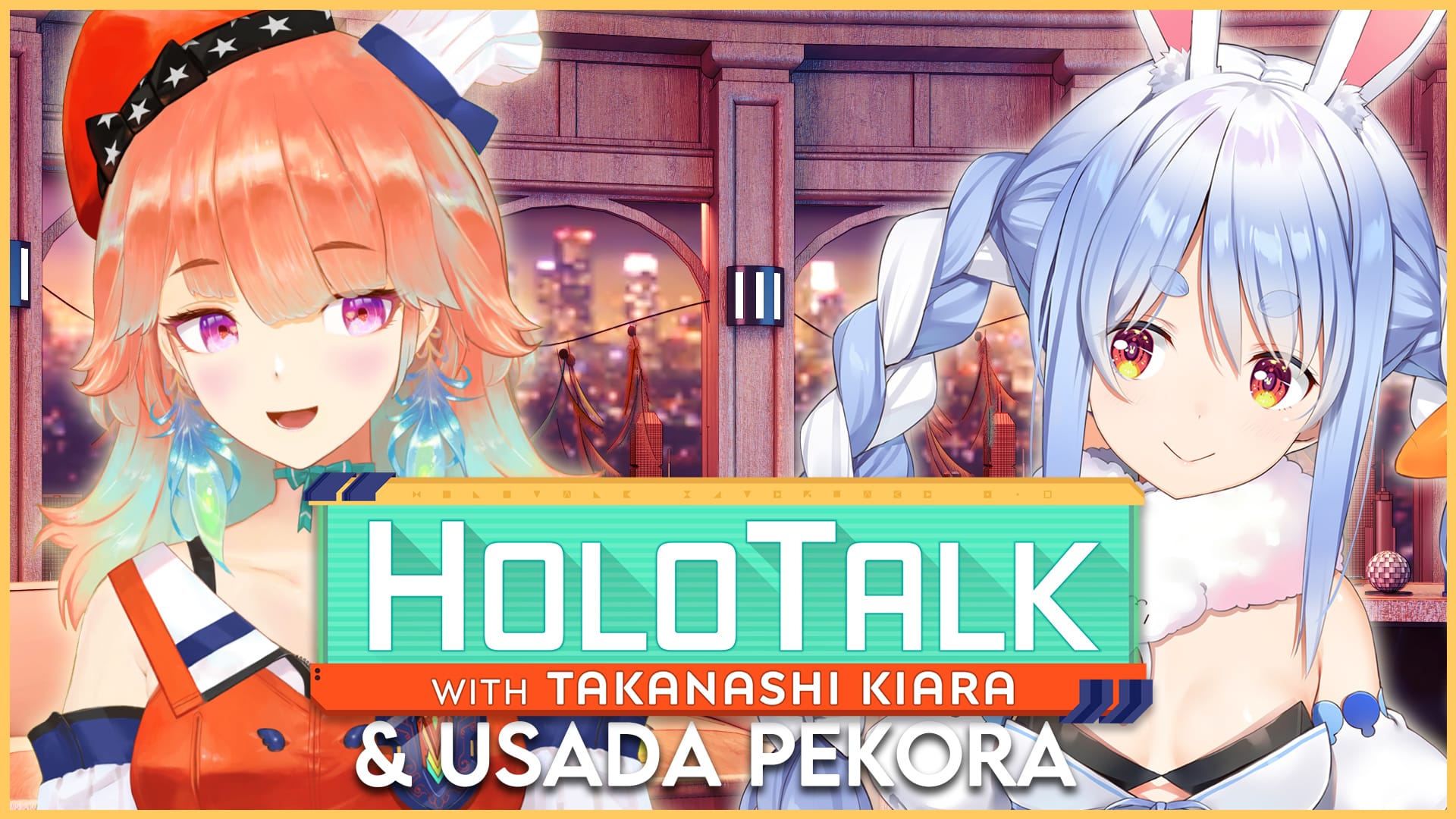
One thing I’ve always found interesting about your channel is Holotalk, a talk show introducing other talent and figures at the company, especially Japanese ones. What’s your personal aim with that show?
Last year, I was super busy with the world tour and the EN concert and fests…there were so many things keeping me busy, so I couldn’t do Holotalk episodes as often anymore. We also had a few members graduate, and I felt like before they left I wanted to give them their own episodes. I would do one…and then I’d get busy again. Someone would graduate, and I’d interrupt everything for them. So I haven’t been able to do regular episodes for a while [laughs], but I really want to continue it.
I never want to rush through it, and just get every member done as quickly as possible. I want the members to be here for a while so they can collect experience and memories that they can tell me about later. Have achievements, have songs out, maybe do a concert. I’ve been giving it some time to cook…and they’ve been cooking. It really is time to go back and serve the dinner.
There’s some English fans who speak Japanese…but I’d say the majority don’t speak or understand Japanese. But they have interest in the Japanese talent, but since they don’t speak it fluently, they’ll just rely on clips that are translated. And I always feel like that’s just scratching the surface. It would be much nicer to get across the deeper details and personality tics of the Japanese talent that aren’t captured in those little two to three minute clips. That’s what I try to do. That’s when I have those interviews I try to avoid the most basic questions. I try to bring in deeper questions that bring out the “lore bits” of the members. Even just the trivia of those members.
I also like to show off my own selected clips. I’ve been hiring clippers to make clips just for the show, and then I choose the moments to show off all the things that are special about this talent that the viewers should know about. Especially for talents that have been around for more than two or three years, some of our senpai who have been around six or seven years, and maybe newer English fans know everything they’ve accomplished before they fell down the rabbit hole. I like to showcase even older achievements that aren’t being spoken about or being appreciated today…but we need to dig deep and appreciate every little achievement of them.
You talked about hololive English having its own sort of culture at this point. How often do you interact with Japanese talent or the Japanese side of the company nowadays?
Unfortunately, I think it’s becoming a bit more rare. In my first couple of years, I was very focused on building friendships with the Japanese members. Partially because I’ve been trying to make my content more accessible for English-speaking viewers, I felt like doing too many Japanese collabs on my channel at least might result in many viewers not understanding them. There hasn’t been too many interactions, though I’m still open to doing collabs on their channel. And I still meet them here and there. Plus, for 3-D lives, I like to invite them because they are great performers, and I love singing and dancing with them.
But also…I love the Indonesia branch. I love them so much too! They are all so funny and silly and passionate. I really want to put a lot of attention on them too. I even went on a vacation with Reine to the Maldives for one week. I’m also really close to Kobo Kanaeru.
It’s really hard to balance everything, interacting with English members and Japanese members and Indonesian members [laughs]. And still doing solo streams…as fun as collabs are, if you do too many fans start missing the one-on-one streams. The time between you and me. It’s hard to balance while still keeping up good relations. I’m constantly trying to find the golden middle.
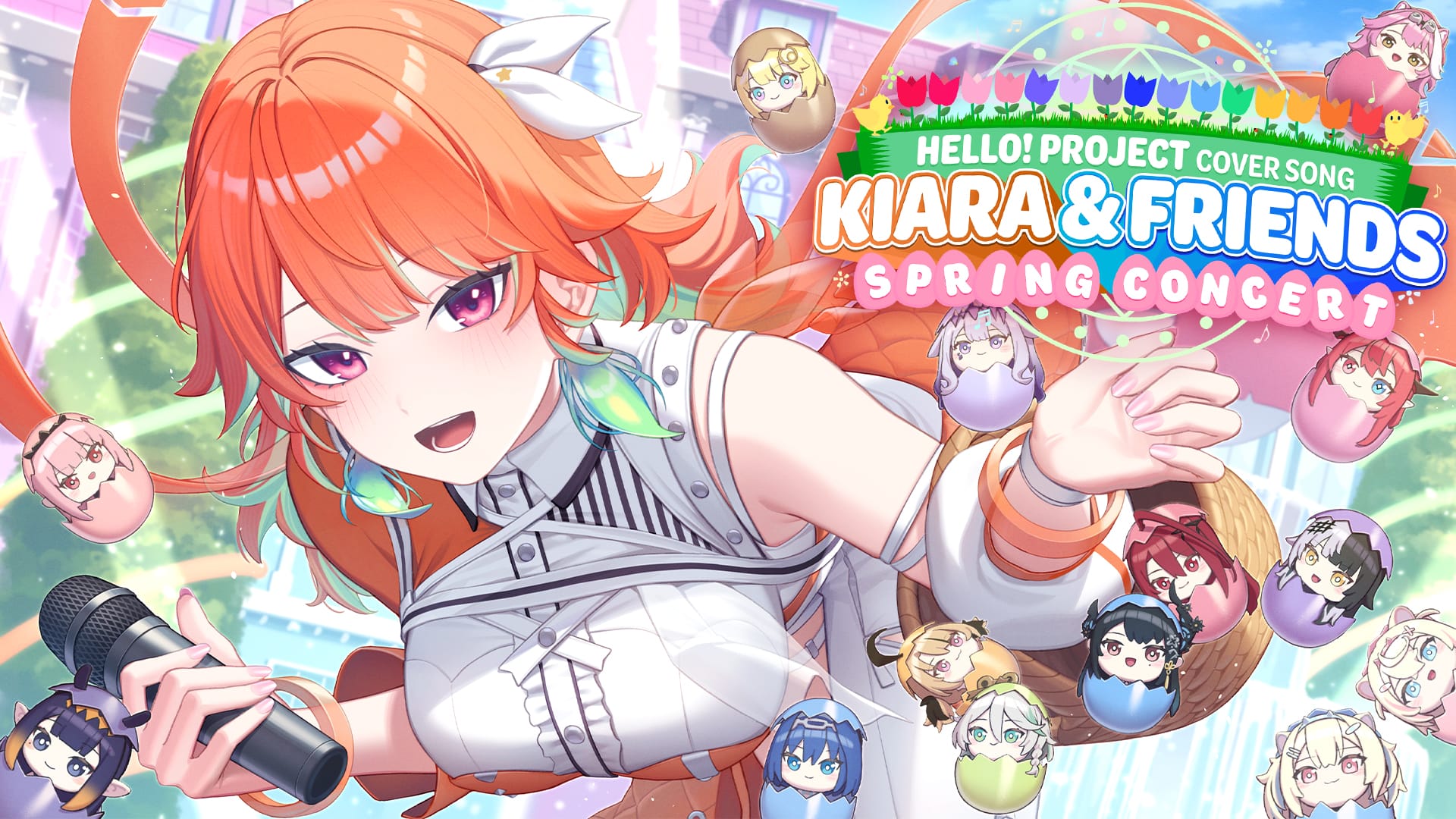
We’ve talked a bit about K-pop influencing your music lately, but I wanted to turn our attention towards the spring live you did, which was nothing but Hello! Project songs. Where did the idea to do that come from?
Hello! Project is perhaps the whole reason why I’m here today. When I was really young I fell down the Hello! Project rabbit hole. They made me feel like I wanted to be an idol, and that got me into Japanese culture, and studying Japanese. I had so much love for it back in the day. I was following it for years and going to concerts, but there’s some groups I really liked that have since ended their activities. I’ve mostly moved on…I guess I’ve kind of grown out of it. I think the direction changed a bit for groups like Morning Musume. I still love that whole company, and what they put out. It really shaped me, that whole era of my life.
I wanted to pay respect to that, and create a whole homage concert. Up until then, I often talked about Hello! Project in my streams, and here and there I would add some songs from that universe into my karaoke streams to introduce them to it, but I feel like I needed to create a big concert to bring across what’s great about Hello! Project. I used to dream about being part of Hello! Project [laughs] so, putting it on a big stage and recreating those same songs with the same dance moves and creating little Hello! Project groups of my own using hololive members helped me live out my fantasy a bit. [laughs]
It was a huge passion project, and most people really liked it even though most viewers haven’t heard these songs before…or even heard of Hello! Project before.
It’s interesting hearing all of this after you talked about having to appeal more to English-speaking viewers…to me, Hello! Project is such a tricky thing to introduce to people. To me you’re really shining a light on a side of Japanese pop that doesn’t get that attention.
And it was so much fun too! If I could I would immediately follow it up with a second Hello! Project covers concert, because there’s still so many bangers and classics I wish I could show off. And the choreography is so intricate and fun…same with the formations, and the chants! The chants can be so easy to do, but fun. [excited] I just wish I could do more! But there’s only so many chances I get to do a 3-D concert, so I have to value it. But Hello! Project deserves much more love overseas, so I’m glad I could showcase it.
Last, five years into your time with hololive, what are you most proud of?
Finding my own style in music. I think my music stands out in hololive, and I feel very comfortable and proud about it. Also, I’m just very proud of being part of Myth in the first place. Being the ones who created hololive English. There were a lot of hurdles along the way, and we worked through it. We parkoured our way over all of them. I’m still here, standing relatively strong after so much has happened. Even though Gura and Amelia have parted ways now, I think we still want to carry that legacy, and let Myth live on longer and stronger so that people will continue to love it for what it is. One day, even if we are all gone, hopefully people won’t forget Myth even then. For now, we will continue to work hard at bringing VTuber culture out there into the world and spread what it’s all about: Entertainment and fun and love and harmony and friends. Friendship! [laughs]
